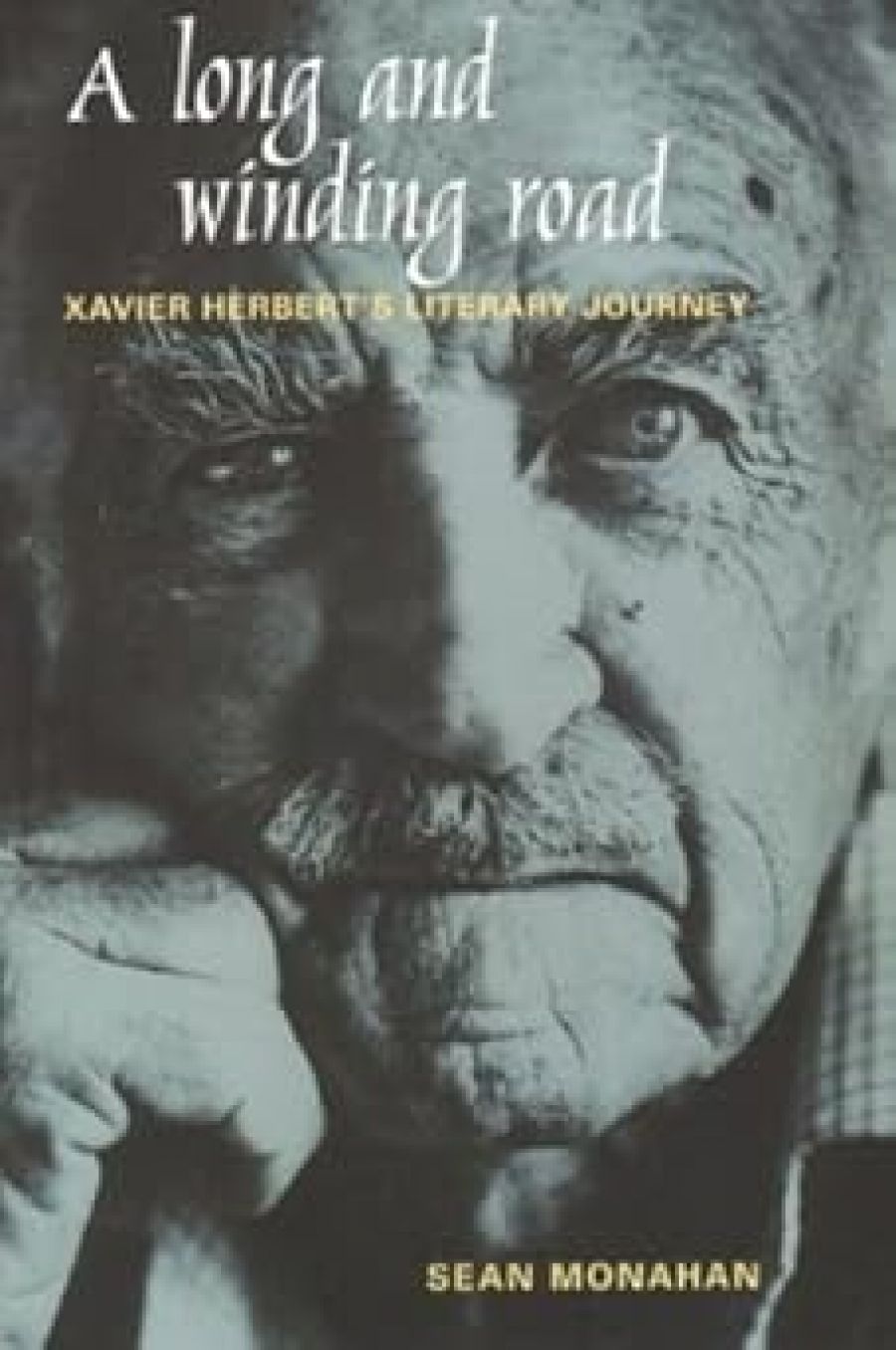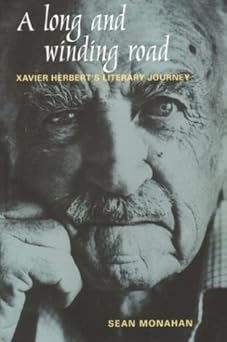
- Free Article: No
- Contents Category: Literary Studies
- Review Article: Yes
- Article Title: Romancer and Anatomist
- Online Only: No
- Custom Highlight Text:
This, the first major study of Xavier Herbert’s literary journey, is a superb work of scholarship. It is written with passion, good humour and a clear acknowledgment of the faults, both personal and literary, of its subject. Sean Monahan is an enthusiastic admirer of Poor Fellow My Country (1975). According to Monahan, it is not only the quintessential Australian novel, but also ‘one of the great novels of world literature’ – an enthralling yarn as well as a symbolic vision of the difficult path to racial reconciliation. Above all, he says, it is an illuminating picture of a whole culture.
- Book 1 Title: A Long and Winding Road
- Book 1 Subtitle: Xavier Herbert's literary journey
- Book 1 Biblio: UWA Press, $38.95 pb, 333 pp
- Book 1 Cover Small (400 x 600):

- Book 1 Cover (800 x 1200):

The key to failure lies, he argues, in Herbert’s personality, so clearly revealed in Frances de Groen’s Xavier Herbert (1998) and the Xavier Herbert Letters (2002), edited by de Groen and Laurie Hergenhan. As a result of his egotism and radical sense of his own destiny, Herbert refused to take advice, indeed read all advice as personal insult. He wasted more than a decade in disastrous experimentation on novels that have all but disappeared from critical consideration. Herbert’s noxious attitude towards women, his view of them as sexual prey, commodity or slave, is examined in relation to his difficulties with characterisation. The appalling record of his sexual activities, from the serial rape of a teenage unfortunate – despite her ‘incessant imploring and snivelling’ – which Herbert boasts about in his autobiographical Disturbing Element (1963), to his seduction of his editor, reveal him as a heartless predator. His gross psycho-sexual theories of femininity were also a hindrance to the creation of credible female characters or sexual relationships. His eventual withdrawal into solitude, as well as benefiting his writing, was obviously a boon to at least half the population.
But Monahan carefully relates the components of failure to the successes of the major novels, and concludes that, given time, solitude and the conventions of a different kind of writing, they were eventually turned to good effect. The success of Poor Fellow My Country was, paradoxically, also the product of Herbert’s peculiar personality and his way of viewing the world. Herbert did not understand, listen to or even like people: hence the frequent failures of dialogue and characterisation. But as a ‘dreamer, romancer, a symbol thinker, a natural allegorist’, he was just the kind of thinker and writer to tackle the big theme – Australia itself.
Monahan rejects earlier readings of both Capricornia and Poor Fellow My Country and sets up his own critical structures. Capricornia, he contends, is not solely a novel of ‘social protest’, a plea for ‘decent treatment of Aborigines and half-castes’. Nor is the world of the novel, as Vincent Buckley maintained, one of ‘cosmic injustice’ where people are victims of ‘metaphysical forces even more final and malignant’ than any social agency. Monahan argues instead for a sustained vision of the ‘unpredictability’ of life, the chief agent of ‘unpredictability’ being nature; often destructive, but as often acting as a stimulus to human ingenuity. Whatever our position on this point, we can agree on the broad scope of the two novels and the difference between them. In Capricornia, the ‘free spirit of Australia’ is threatened from without; in Poor Fellow My Country, from within. The latter is a much more pessimistic work.
Many critics have judged Poor Fellow My Country on the grounds of its failure to comply with the traditional pattern of the novel. Monahan proposes different criteria, those outlined by Northrop Frye in his Anatomy of Criticism. Frye considered the term ‘novel’ as applicable to only one form of prose fiction, the others being ‘confession’, ‘romance’ and ‘anatomy’. Poor Fellow My Country, according to Monahan, combines elements of confession, high romance and anatomy. The latter allows for the didacticism, the lengthy discussions, the digressions in order to explore ideas as well as the connection with satire, and the comedy of humours that critics have noted, and sometimes slated, in Poor Fellow My Country.
Monahan argues with enthusiasm and sophistication. But although his argument accounts for the book’s prolixity and self-indulgence, it does not fully excuse it; the test must still lie with the reader. Poor Fellow My Country is not alone in its mixture of Frye’s categories of prose fiction. Drusilla Modjeska’s The Orchard (1994) springs to mind, as does Marion Halligan’s The Fog Garden (2001). We call these works ‘faction’, a simplification that perhaps evades closer study of the components and their relationship to one another. Faction is almost the fashion at the moment, especially in prose fiction by women. The point at issue is how well integrated the elements are and how much digression and pontification the reader will tolerate.
Capricornia will always be one of the greatest of Australian novels, a defining work in the search for what it is, or was, to be Australian. Poor Fellow My Country is everything Monahan says it is, but will continue to divide readers. The enthusiast will stay the distance, and Monahan’s study will add to the understanding and enjoyment of the book. The impatient or irritable reader will still pass Poor Fellow up for easier, more simplistic fiction, and be the poorer for it.


Comments powered by CComment